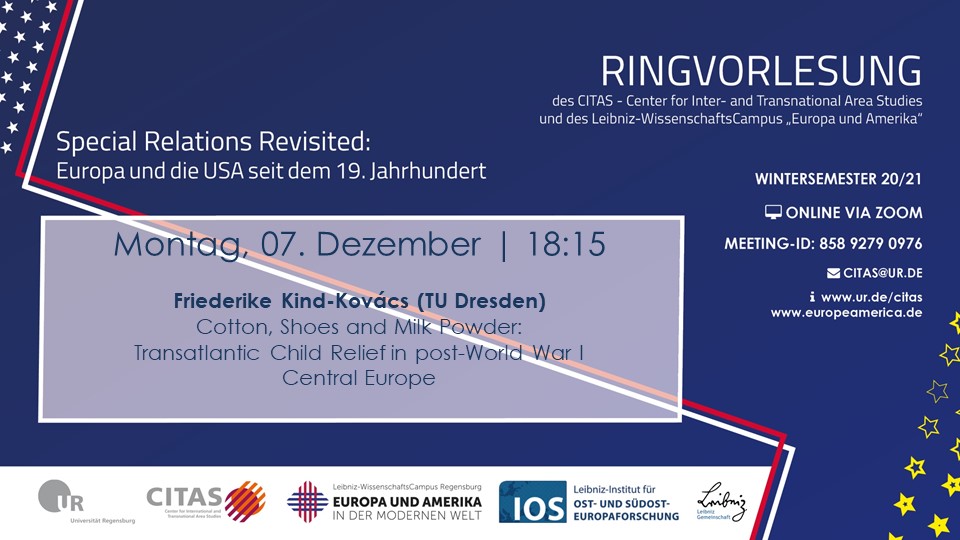Lecture Series: Transatlantic Child Relief in post-WWI Central Europe (Friederike Kind-Kovács)
Friederike Kind-Kovács explores US child relief efforts in post-WWI Central Europe in her lecture for the "Special Relations Revisited" series. This lecture will be held in English.
Cotton, Shoes and Milk Powder: Transatlantic Child Relief in post-WWI Central Europe
The proposed talk explores transatlantic child relief in post-WWI Central Europe. While exemplifying the case of Budapest’s children in need, the talk seeks to reconstruct how, in the aftermath of the First World War, Central Europe became a laboratory of transatlantic humanitarian intervention. It explores how the capital’s children triggered humanitarian sentiments and large-scale material intervention from the United States. It exemplifies how the American Relief Administration and the American Red Cross became invested in delivering tons of material ‘things’, such as cotton, shoes and milk powder, to Budapest’s impoverished and starving children. Here the talk investigates how transatlantic humanitarian child relief consolidated images of destitute Central Europe, while contrasting them with notions of the modern and wealthy U.S. which could not just win the First World War but also this war against hunger and destitution. Examining discourses and everyday practices of relief, the analysis throws light on the ambiguous repercussions of ‘humanitarian’ relief both on local recipient societies and on transatlantic power relations.
Baumwolle, Schuhe und Milchpulver. Transatlantische Kinderhilfsprojekte in Mitteleuropa nach dem ersten Weltkrieg
Der Vortrag untersucht transatlantische Kinderhilfsprojekte in Mitteleuropa nach dem ersten Weltkrieg. Am Beispiel von Budapests bedürftigen Kindern rekonstruiert der Vortrag, wie Mitteleuropa nach dem ersten Weltkrieg zu einem Labor für transatlantische humanitäre Intervention wurde. Er untersucht, wie die Kinder der Hauptstadt in den USA humanitäre Empfindungen auslösten, die zu materiellen Hilfen in großem Umfang führten. Die American Relief Administration und das amerikanische Rote Kreuz zeigen beispielhaft das Interesse daran, Tonnen an materiellen ‚Dingen‘ wie Baumwolle, Schuhe und Milchpulver an verarmte und hungernde Kinder in Budapest zu liefern. Der Vortrag beleuchtet, wie transatlantische humanitäre Hilfen für Kinder Bilder des notleidenden Mitteleuropas verstärkten und zugleich mit Vorstellungen der modernen und wohlhabenden Vereinigten Staaten kontrastierten, die nicht nur den ersten Weltkrieg sondern auch diesen Krieg gegen Hunger und Not gewinnen konnten. Durch die Untersuchung von Diskursen und Alltagspraktiken der Hilfsprojekte beleuchtet die Analyse die zwiespältigen Auswirkungen der ‚humanitären‘ Hilfe auf die lokalen Empfängergesellschaften und auf die transatlantischen Machtverhältnisse.
Friederike Kind-Kovács is Acting Professor for Modern and Contemporary History at TU Dresden and a researcher at the Hannah Arendt Institute for Totalitarianism Studies at TU Dresden. She completed her habilitation degree in East and Southeast European History at the University of Regensburg in May 2019. She gained her PhD from Potsdam University and an MA from St Andrew's, Scotland. This lecture draws on her forthcoming book, Budapest's Children: Humanitarian Relief in the Aftermath of the Great War, which is being prepared for publication with Indiana University Press. She has also published extensively on samizdat/tamizdat writings, broadcasting in the Cold War and public health in Central and Eastern Europe.
When? Monday, 7 December 2020, 18:15
Where? Online via Zoom, https://uni-regensburg.zoom.us/j/85892790976, Meeting ID: 858 9279 0976
The lecture series "Special Relations Revisited: Europa und die USA seit dem 19. Jahrhundert" investigates how transatlantic relations have changed over the past 200 years. It is organized together with CITAS. Find the full programm here.

